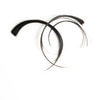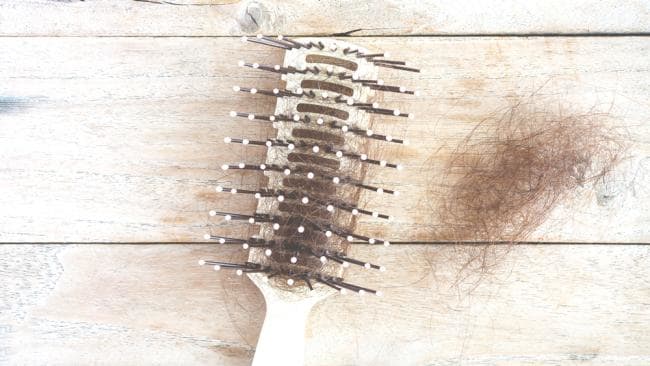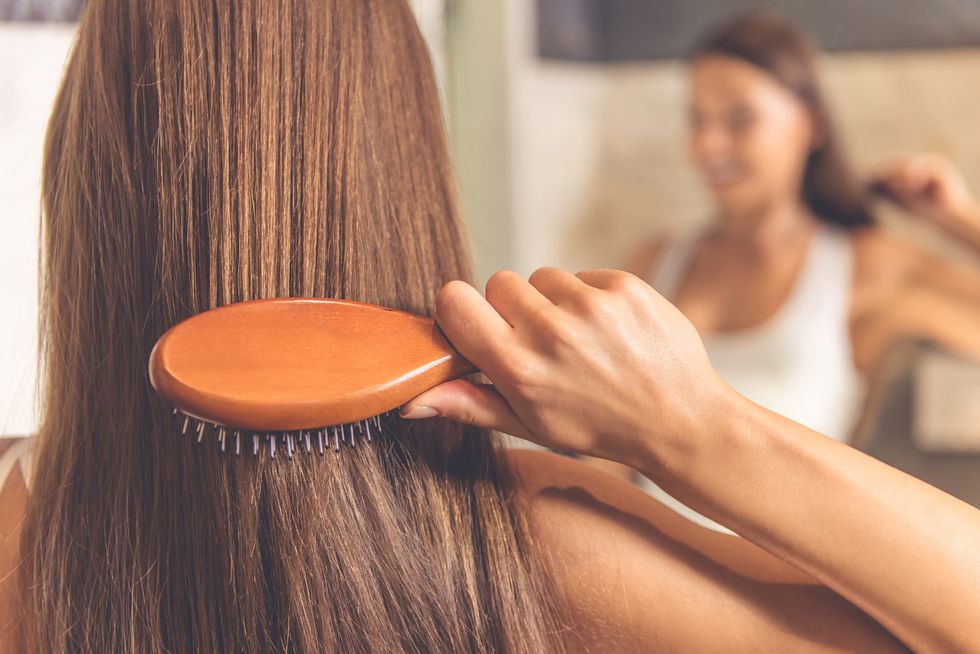|
In a study conducted in mice, researchers from Johns Hopkins were able to confirm that a Western-style diet — high in fats and cholesterol — has a negative impact on hair and skin health. They went even further, however, developing a drug that is able to reverse the damage. In an open access paper recently published in the Nature journal Scientific Reports, Subroto Chatterjee and colleagues from Johns Hopkins Medicine in Baltimore, MD, show that a diet high in fats and cholesterol can lead to skin inflammation, as well as hair loss and hair whitening.
Based on their initial findings, the researchers also developed an experimental drug, D-threo-1-phenyl-2-decanoylamino-3-morpholino-1-propanol (D-PDMP), hoping it would help them reverse the effects of an unhealthful diet on skin and hair. D-PDMP regulates the production of a type of fats (lipids) known as "glycosphingolipids" (GSLs), which are part of the membranes of skin cells and other cell types. In particular, GSLs are a major component of skin cells that make up the external skin layer and of keratinocytes, a type of cell that participates in the pigmentation, or coloring, of skin, hair, and eyes. "Further research is needed, but our findings show promise for someday using the drug we developed for skin diseases such as psoriasis and wounds resulting from diabetes or plastic surgery," says Chatterjee. Western diet tied to hair, skin damage The research team tested the effects that a fatty diet would have on the skin and hair of mice, as well as the effectiveness of the specially designed compound in offsetting the damage. Chatterjee and team worked with a group of mice that they had first genetically modified to express symptoms of atherosclerosis, a condition in which fat deposits form inside arteries, obstructing the free flow of blood. The researchers split the mice into two distinct groups: one of these was assigned a regular mouse diet, while the other was allocated a high-fat, high-cholesterol diet — similar to a Western-style regimen. All the mice were 12 weeks old when they started on their respective diets, and the researchers conducted their first assessments when the mice were 20 weeks old. The team found that the mice on a Western-style diet had begun to lose hair and displayed hair whitening and skin lesions. At 36 weeks of age, 75 percent of the mice that had stayed on the high-fat and high-cholesterol diet had multiple skin lesions, as well as more severe hair loss. When the mice were between the ages of 20-36 weeks, the researchers gave them all D-PDMP in varying amounts, either in liquid form or in capsule form, as they each stayed on their assigned diet. After receiving either 1 milligram and 10 milligrams per kilogram of body weight of D-PDMP in capsule form, the mice on a fatty diet started to regain their lost hair, as well as their initial hair color. Skin damage also started to heal. Chatterjee and team also noted that treating the rodents with 1 milligram of D-PDMP in capsule form per kilogram of body weight was as effective in reversing skin and hair damage as 10 milligrams in liquid form per kilogram of body weight. This, the researchers explain, suggests that capsules are more effective in delivering the compound. Experimental drug may restore health So, what did D-PDMP do specifically? The research team observed that the skin of mice following a Western-style diet showed numerous signs of neutrophil infiltration. Neutrophils are a type of white blood cell that plays a role in inflammation. Encapsulated D-PDMP reduced the number of neutrophils observed, suggesting that the substance was effective in reducing skin damage and inflammation. The researchers also noted that rodents on a fatty diet had modified levels of three important kinds of lipids — ceramides, glucosylceramides, and lactosylceramides — which normally help to maintain skin health. 'Faster, more effective recovery'" Our findings show that a Western diet causes hair loss, hair whitening, and skin inflammation in mice, and we believe a similar process occurs in men who lose hair and experience hair whitening when they eat a diet high in fat and cholesterol," emphasizes Chatterjee. While the study researchers are hopeful about the promising results they obtained with D-PDMP in mice, they nevertheless point out that more animal research has to be carried out, in order to establish exactly how much of the compound is necessary to fully treat the damage caused by Western-style diets in hair and skin. Moreover, the team also warns that the results seen in mice may not apply to people, as that is an aspect that is yet to be confirmed. D-PDMP's safety for human ingestion has also not yet been established. Still, the scientists think of their current findings as the first step toward better ways of maintaining or restoring hair and skin health. This article first appeared on Medical News Today Cue the celebration emoji—the scale is moving in the direction you want it to! But...then you start to notice that your hair is falling out. Like, a lot of it. WTH? Before you panic and assume you’re going bald, know this: What you're going through is completely normal. “We know that, clinically and anecdotally, hair loss is associated with rapid weight loss or weight loss associated with stress,” says Ken L. Williams Jr., D.O., a hair-restoration specialist, surgeon, and author of Hair Transplant 360 – Follicular Unit Extraction. In other not-fair news, the more weight you lose, the more likely you are to experience some form of hair loss, says Beth Warren, R.D.N., founder of Beth Warren Nutrition and author of Living a Real Life with Real Food. It all comes down to ~nutrients~, says Fatima Cody Stanford, M.D., M.P.H., an obesity medicine physician at Massachusetts General Hospital. People often don’t take in enough protein when they lose weight, she explains. And, when you don’t get enough protein, your body has to decide where to send the protein it does have. Given that your hair isn’t crucial to your survival, it gets the leftovers, Stanford says—and that can lead to hair loss.
Ready for the good news? This is temporary. “When people stop losing weight, the hair loss usually resolves itself,” Warren says. If you’re planning to lose a lot of weight and want to minimize the...er...fallout, try keeping tabs on how much protein you’re getting, and aim to get your recommended daily amount—that would be 46 grams. It’s also a good idea to try to get some zinc in your diet, Stanford says, since it's a key mineral for hair growth (as well as skin and nail growth). You can get it by eating:
You may also want to take a zinc supplement to be totally sure you’re getting enough, says Stanford. (Just check in with your doctor first, which is a must before taking any kind of supplement.) If you do start to lose your hair, despite your best efforts, and it’s bothering you, Williams recommends taking a biotin supplement or even a prenatal vitamin, both of which have a lot of extra vitamins your body probably is probably craving right now. You can also try monoxidil (a.k.a. Rogaine), which stimulates hair growth, he says. And in the meantime, repeat after me: "This is not permanent." This article first appeared on Women's Health Who knew something as simple as taking a shower could be so challenging?
Most of us have been showering regularly since we were kids. We’ve got the whole thing down. Or so we thought. After talking to a hairstylist and dermatologist, we’ve found out a few things that we’re actually doing wrong. Click through and check out if you’re making these showering mistakes. The water’s too hot. There’s nothing like starting the day off with a nice hot shower. But if the water temperature is too high, it can actually do more damage than good. “Hot water can strip the natural oils from your skin, leaving it dry and vulnerable to cracking,” explains dermatologist Dendy Engelman. “Losing these oils compromises our skin’s barrier, thus protection from irritants.” This is most dangerous in the winter (when you’re most tempted to use extra hot water) because skin is already prone to dryness. And apparently hot water isn’t great for hair health either. Butterfly Studio Salon’s expert stylist Jason J Dougherty explains that it’s best to use warm water to open up the hair cuticle to remove dirt and oils. Then, rinse with cold water to close it up. “It will prevent hair loss in the shower, reduce frizz, and add a lot more shine,” he says. Your water’s unfiltered. There are certain places that have hard water, which can have a negative effect on your hair and skin. What this means is that the unfiltered water may contain many harmful additives such as minerals, oxidizers, calcium, magnesium, silica, and iron. “These can leave residue on the skin and hair causing build-up, dryness, and irritations,” explains Dr. Engelman. With the residue leaving a coat over the skin and hair, products are unable to fully penetrate to properly clean the area. This can create dull looking finish to both the hair and skin. Dougherty also explains that these chemicals can strip hair color, dulling out the look. So if you do happen to live in an area with hard water, install a filtering system. You’re using the wrong cleanser. Just because you like the smell of the body wash you’ve been using for years, doesn’t mean it’s the best option. A lot of available cleansers contain harmful chemicals, fragrances, parabens, and sulfates, which all can increase flare-ups. Dr. Engelman recommends oil-based cleansers to maintain hydrated, healthy skin. “Oil-based cleansers eliminate impurities without drying out the skin,” she explains. “Essentially the oil binds to the oils on your face and the cleanser rinses them away, without striping your skin of its good natural oils.” You’re shampooing too much. Unless you have ultra-fine, thin hair, you really don’t need to wash it every day. If you’re over-shampooing, the results are similar to using harsh chemicals on your skin. “It strips the hair of its natural oils and will lead to your hair becoming quite dry and brittle over time,” explains Dougherty. So if you notice your hair seems drier than usual, cut back to shampooing every other shower. It’s all about finding the right balance. You’re over exfoliating. Exfoliating can be seriously beneficial to the skin. It rids the skin of any dead skin cells and promotes cell turnover. However, over-exfoliating can do a lot of damage. “It will expose the skin, weaken skin-barrier function and in some cases trigger inflammation,” explains Dr. Engelman. This can create a sort-of vulnerability to the skin and create sensitivity, infection or irritation. Ideally, you only need to be exfoliating two or three times a week. And if you are experiencing any sensitivity or inflammation, you should cut back. You don’t moisturizer post-shower. Dr. Engelman notes that the few minutes post-shower can be just as important as those spent in the shower. And post-shower, moisturizing is key. “Applying oil and lotion on wet skin will allow the product to lock moisture in by trapping some of the water on the skin,” she explains. “Keeping it from evaporating, the glycerin in the lotion helps to bind to water molecules, which not only gives a soft, supple feeling but strengthens the skin barrier.” This little shift in habit can make all the difference to the skin’s health and overall feel. This article first appeared on Domino.com 2/12/2017 How Stress Affects Your Hair & SkinHow Stress Affects Your Hair & Skin
by Kerri Lee-Young In our latest article, How Stress Affects Your Body, we took you on a head-to-toe journey and shared with you just how damaging stress can be on your overall health. We also shared what the three different types of stress are and how to overcome them in your life. To show you how stress affects you on the outside, we’re going to breakdown what it can do to your skin and hair if you don’t address and resolve what’s stressing you out. How Stress Affects Your Skin When you become stressed, there’s this hormone that gets released into your body called cortisol. This is an adrenal hormone that (along with epinephrine) primarily aids in “fight or flight” situations. When you become stressed, and when stress goes from acute to chronic, cortisol levels rise and go from being helpful to dangerous. When you’re under an insurmountable level of stress, your skin becomes more sensitive and vulnerable. It also has a harder time healing. When the body signals the adrenal glands to produce cortisol, it causes your sebaceous glands to produce more oil. If you already have oily skin, then you experience an increase in acne and breakouts. And to make matters worse, it can also trigger a breakout in hives, rashes and fever blisters no matter what your skin type is. If you are already suffering from Psoriasis, Rosacea or Eczema, then your already severe condition is going to worsen. Having a skin condition is a stressful situation, and as your skin worsens, it can lead to feelings of embarrassment and isolation. To reduce the effects of stress on your skin, we recommend the following:
How Stress Affects Your Hair We’ve all endured a level of stress that has made us scream, “This is making me pull my hair out!” But the sad reality of it all is that you don’t really need to pull any of your hair out when you’re stressed since it’s going to fall out anyways. That’s one of the main marks stress makes on your hair—hair loss. There’s actually three different types of hair loss:
We also must point out that experiencing hair loss is not only stress-related and can sometimes be attributed to other medical conditions like Hypothyroidism and Polycystic Ovary Syndrome (PCOS). If you are experiencing hair loss, we do recommend you see a medical expert first and foremost. Many people say that stress causes gray hair, but there’s some myth (and actually a little truth) surrounding that statement. Gray hair is genetic, not stress-induced, BUT…if you are predisposed to getting gray hair, then stress will speed up this process and make these white strands appear sooner. As far as ways to combat stress and to prevent experiencing hair loss, thinning and premature graying, we recommend you follow some of the strategies we’ve already mentioned above and recommend you practice a few more like these. Sometimes, all it takes is five minutes to help feel less stressed. Surely you can find five minutes in your day to protect your health for a lifetime. (source) Teen’s shocking allergic reaction to hair dye patch test which she says saved her life.
One hour after the dye was tested the student's ears ballooned and started weeping. The next day the reaction was even worse, and she was left unable to move her neck. Doctors told Sophie Warren she would have DIED if the dye had been put all over her head. Click on the photo for the full story. What are the reactions to PPD allergy? Reaction caused by the use of hair dye in mild cases usually only involves dermatitis to the upper eyelids or the rims of the ears. In more severe cases, there may be marked reddening and swelling of the scalp and the face. The eyelids may completely close and the allergic contact dermatitis reaction may become widespread. Severe allergy to PPD can result in contact urticaria and rarely, anaphylaxis. |
Hair by BrianMy name is Brian and I help people confidently take on the world. CategoriesAll Advice Announcement Awards Balayage Barbering Beach Waves Beauty News Book Now Brazilian Treatment Clients Cool Facts COVID 19 Health COVID 19 Update Curlies EGift Card Films Follically Challenged Gossip Grooming Hair Care Haircolor Haircut Hair Facts Hair History Hair Loss Hair Styling Hair Tips Hair Tools Health Health And Safety Healthy Hair Highlights Holidays Humor Mens Hair Men's Long Hair Newsletter Ombre Policies Procedures Press Release Previous Blog Privacy Policy Product Knowledge Product Reviews Promotions Read Your Labels Recommendations Reviews Scalp Health Science Services Smoothing Treatments Social Media Summer Hair Tips Textured Hair Thinning Hair Travel Tips Trending Wellness Womens Hair Archives
April 2025
|
|
Hey...
Your Mom Called! Book today! |
Sunday: 11am-5pm
Monday: 11am-6pm Tuesday: 10am - 6pm Wednesday: 10am - 6pm Thursday: By Appointment Friday: By Appointment Saturday: By Appointment |






 RSS Feed
RSS Feed